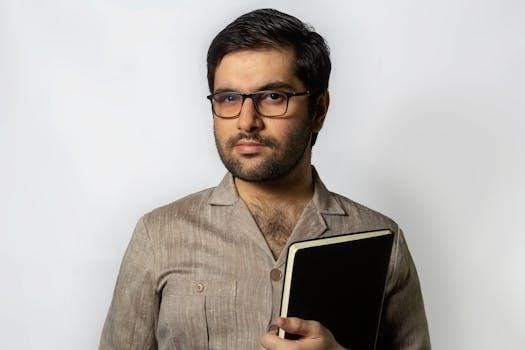Embark on a journey through the Book of Habakkuk, exploring its unique dialogue between the prophet and God. Discover how Habakkuk grapples with injustice and violence, ultimately finding faith in God’s promises. This study guide offers insights into this profound biblical text.
The Book of Habakkuk, a part of the twelve minor prophets, presents a unique dialogue. Unlike other prophetic books, it focuses on a conversation between Habakkuk and God, rather than directly addressing the people of Judah. Habakkuk wrestles with questions of God’s goodness in the face of prevalent evil and injustice. The book explores themes of faith, sovereignty, and God’s ultimate justice. Habakkuk’s personal struggle reflects a universal human experience of questioning God’s plan amidst suffering. Ultimately, it affirms God’s control and encourages the righteous to live by faith, trusting in God’s promise to set things right, even when circumstances seem bleak.

Author and Date
The Book of Habakkuk is attributed to the prophet Habakkuk, though historical details about him are scarce. Determining the precise date of his prophecy requires examining the historical context referenced within the book.
Prophet Habakkuk
The prophet Habakkuk, the attributed author of the book, remains a figure shrouded in limited historical information. Unlike many prophetic books that directly address the people, Habakkuk presents a unique dialogue between the prophet and God. His name, possibly meaning “embrace,” hints at his role as one who grapples with divine mysteries. Habakkuk’s profound questions concerning God’s justice in the face of prevailing wickedness reveal his passionate desire for understanding. His willingness to challenge God and seek answers underscores the depth of his faith and commitment to divine truth within a broken world needing redemption.
Time of Prophecy
Habakkuk prophesied during a crucial transition in global power, specifically in the final days of the Assyrian Empire and the rise of Babylonian dominance. This period, marked by increasing violence and injustice, set the stage for Habakkuk’s profound questioning of God’s plan. Internal corruption festered within Judah, further contributing to the prophet’s distress. It is believed Habakkuk prophesied just before Nebuchadnezzar’s invasion of Judah, a pivotal event that resulted in the nation’s captivity. His prophecies provide insight into the anxieties and uncertainties experienced during this era of political upheaval and moral decline, highlighting the struggle to maintain faith.
Historical Context
Understanding Habakkuk requires examining the decline of the Assyrian Empire and the ascent of Babylon. This shift in power created instability and injustice, forming the backdrop for Habakkuk’s prophetic message and his struggle with God’s apparent inaction.
Assyrian Empire’s Decline
The once mighty Assyrian Empire, known for its military prowess and brutal conquests, was in a state of decline during Habakkuk’s time. Internal strife, overextended resources, and rebellions from subjugated peoples weakened its grip on power. This decline created a power vacuum in the ancient Near East. The Assyrian capital, Nineveh, faced increasing threats from rival empires, signaling a shift in the geopolitical landscape. This period of instability and uncertainty profoundly impacted the surrounding nations, including Judah, setting the stage for new empires to emerge and challenge the existing world order, leading to widespread fear.
Rise of Babylon
As the Assyrian Empire weakened, Babylon, under the leadership of Nabopolassar and later his son Nebuchadnezzar, rose to prominence. Babylon’s military strength and strategic alliances allowed it to challenge Assyrian dominance. The Babylonians capitalized on Assyria’s internal struggles, eventually overthrowing them and establishing a new empire. Nebuchadnezzar’s reign marked a period of expansion and cultural flourishing for Babylon. This shift in power dramatically altered the political landscape, impacting Judah and other nations in the region. The rise of Babylon signaled a new era of imperial rule, with its own set of challenges and opportunities for those under its influence, causing much unrest.

Purpose of the Book
Habakkuk addresses the problem of injustice, exploring how God’s people should live when surrounded by wickedness; It emphasizes faith in God’s promises, even when circumstances seem dire, showing God’s sovereignty.
Addressing Injustice and Violence
Habakkuk grapples with the apparent triumph of the wicked and the suffering of the righteous. He questions God’s inaction in the face of widespread injustice and violence in Judah. The prophet struggles to reconcile God’s holiness with the reality of evil prevailing around him. This complaint forms the basis of Habakkuk’s initial dialogue with God, seeking understanding about God’s plan amidst the moral decay. He wants to understand why God allows such things to happen, so that the people can get over it. It forms the basis of Habakkuk’s dialogue with God.
The Righteous Live by Faith
A central theme in Habakkuk is that the righteous will live by their faith (Habakkuk 2⁚4). This speaks to trusting in God’s promises even when circumstances seem dire. It’s an affirmation that true life and victory are found in unwavering faith in God’s character and plan. Habakkuk sees the darkness of the world as an invitation to have faith in God’s promise to set things right. Living with such faith means trusting that God is sovereign and omnipotent, and He has all things under control, ultimately leading to salvation.

Structure of Habakkuk
Habakkuk’s structure is unique, primarily unfolding as a dialogue between the prophet and God. This format allows for exploration of Habakkuk’s questions and God’s divine responses, creating a compelling narrative.
Dialogue Between Prophet and God
The Book of Habakkuk stands out among prophetic works due to its structure as a dialogue between the prophet and God. Unlike other books that directly address the people, Habakkuk presents a personal conversation. The prophet voices his complaints about injustice and God responds, offering divine perspective and assurance. This dialogue format provides unique insight into Habakkuk’s struggle with faith and God’s ultimate sovereignty. It allows readers to witness the raw, honest questions of a prophet and the comforting, authoritative answers of God, offering a deeper understanding of faith and divine justice.
Key Themes
Habakkuk explores profound themes. God’s sovereignty is central, reminding us He is in control. The book emphasizes faith, urging the righteous to live by trusting God’s promises, even amidst suffering and injustice.
God’s Sovereignty
The Book of Habakkuk firmly establishes God’s sovereignty as a central theme. Despite the presence of wickedness and injustice, Habakkuk affirms that God is ultimately in control of all things. This theme is woven throughout the dialogue between the prophet and God, highlighting that God’s plans will prevail, even when they are not immediately understood. Habakkuk reminds us that God’s power transcends earthly chaos. We must trust His divine authority, and recognize that He orchestrates history according to His perfect will and purpose, in spite of the trials we face.
Faith in God’s Promise
Habakkuk’s journey through doubt and questioning culminates in a profound declaration of faith in God’s promise. The prophet learns to trust that God will ultimately set things right, even amidst present darkness. This theme emphasizes that true righteousness is rooted in unwavering belief in God’s character and His commitment to justice. Living by faith means holding onto God’s promises, trusting that He will fulfill them in His perfect timing. Habakkuk’s example inspires believers to embrace faith, even when circumstances challenge their understanding of God’s plan and purpose.
Habakkuk’s Questions and God’s Answers
Explore the heart of Habakkuk’s prophecy⁚ his bold questions to God regarding injustice and God’s revealing answers. Witness their dialogue, where Habakkuk voices his doubts, and God unveils His plans, challenging the prophet’s perspective.
Habakkuk’s First Complaint
Habakkuk’s initial lament stems from the rampant wickedness and injustice he witnesses in Judah. He cries out to God, questioning why He allows such evil to persist without intervention. The prophet observes violence, oppression, and strife, feeling helpless in the face of such pervasive corruption. He struggles to understand God’s apparent inaction, wondering if his prayers are even being heard amidst the chaos. Habakkuk’s complaint reflects a deep yearning for justice and a longing for God to restore righteousness in the land, challenging God’s perceived silence.
God’s Response⁚ The Chaldeans
God responds to Habakkuk’s complaint with a startling revelation⁚ He is raising up the Chaldeans (Babylonians) as His instrument of judgment. These fierce and ruthless people will sweep through the land, punishing the wickedness of Judah. God’s answer is unsettling, as the Chaldeans are even more wicked than the people they are sent to judge. This response challenges Habakkuk’s understanding of God’s justice, prompting him to question how a holy God can use such an unholy nation to accomplish His purposes. This divine response deeply troubles the prophet.
Habakkuk’s Second Complaint
After hearing God’s response about the Chaldeans, Habakkuk voices his second complaint. He struggles to understand how a just and holy God can use a nation more wicked than Judah to execute judgment. He questions God’s moral standard, finding it difficult to reconcile God’s holiness with the impending destruction brought by the Babylonians. Habakkuk essentially asks how God can remain silent while the wicked devour those more righteous than themselves. This complaint reveals Habakkuk’s deep struggle with God’s ways and His seeming tolerance of evil, challenging God’s character.
God’s Response⁚ Woe to the Wicked
In response to Habakkuk’s second complaint, God delivers a series of “woes” against the wicked Chaldeans. These woes highlight their greed, violence, injustice, and idolatry. God assures Habakkuk that the Chaldeans, despite their current power, will ultimately face judgment for their sins. Their ill-gotten gains will not last, and their violence will return upon their own heads. God’s response emphasizes His justice and sovereignty, promising that even though it may not seem so, the wicked will not escape His righteous judgment. He reaffirms His commitment to justice and His ultimate control.

Habakkuk’s Prayer
Moved by God’s responses, Habakkuk offers a prayer acknowledging God’s power and justice. This prayer is a powerful expression of faith, recognizing God’s past acts and pleading for mercy in the present.
Habakkuk’s Final Affirmation
After his dialogue with God and his subsequent prayer, Habakkuk arrives at a place of resolute faith. Despite the challenging circumstances and the presence of injustice, he affirms his trust in God’s sovereignty and goodness. Habakkuk’s final affirmation is a testament to the transformative power of encountering God. It is a declaration of unwavering faith, even when faced with uncertainty and hardship. This affirmation serves as an inspiration to believers, encouraging them to trust in God’s promises and to find joy in Him, regardless of their present circumstances. Habakkuk’s story reminds us that faith is not the absence of doubt, but the presence of trust in the face of doubt.
